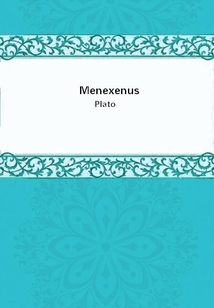最新章節
- 第12章 MENEXENUS(7)
- 第11章 MENEXENUS(6)
- 第10章 MENEXENUS(5)
- 第9章 MENEXENUS(4)
- 第8章 MENEXENUS(3)
- 第7章 MENEXENUS(2)
第1章 APPENDIX I.(1)
It seems impossible to separate by any exact line the genuine writings of Plato from the spurious. The only external evidence to them which is of much value is that of Aristotle; for the Alexandrian catalogues of a century later include manifest forgeries. Even the value of the Aristotelian authority is a good deal impaired by the uncertainty concerning the date and authorship of the writings which are ascribed to him. And several of the citations of Aristotle omit the name of Plato, and some of them omit the name of the dialogue from which they are taken.
Prior, however, to the enquiry about the writings of a particular author, general considerations which equally affect all evidence to the genuineness of ancient writings are the following: Shorter works are more likely to have been forged, or to have received an erroneous designation, than longer ones; and some kinds of composition, such as epistles or panegyrical orations, are more liable to suspicion than others; those, again, which have a taste of sophistry in them, or the ring of a later age, or the slighter character of a rhetorical exercise, or in which a motive or some affinity to spurious writings can be detected, or which seem to have originated in a name or statement really occurring in some classical author, are also of doubtful credit; while there is no instance of any ancient writing proved to be a forgery, which combines excellence with length. A really great and original writer would have no object in fathering his works on Plato; and to the forger or imitator, the 'literary hack' of Alexandria and Athens, the Gods did not grant originality or genius. Further, in attempting to balance the evidence for and against a Platonic dialogue, we must not forget that the form of the Platonic writing was common to several of his contemporaries. Aeschines, Euclid, Phaedo, Antisthenes, and in the next generation Aristotle, are all said to have composed dialogues; and mistakes of names are very likely to have occurred.
Greek literature in the third century before Christ was almost as voluminous as our own, and without the safeguards of regular publication, or printing, or binding, or even of distinct titles. An unknown writing was naturally attributed to a known writer whose works bore the same character; and the name once appended easily obtained authority. Atendency may also be observed to blend the works and opinions of the master with those of his scholars. To a later Platonist, the difference between Plato and his imitators was not so perceptible as to ourselves. The Memorabilia of Xenophon and the Dialogues of Plato are but a part of a considerable Socratic literature which has passed away. And we must consider how we should regard the question of the genuineness of a particular writing, if this lost literature had been preserved to us.
These considerations lead us to adopt the following criteria of genuineness: (1) That is most certainly Plato's which Aristotle attributes to him by name, which (2) is of considerable length, of (3) great excellence, and also (4) in harmony with the general spirit of the Platonic writings. But the testimony of Aristotle cannot always be distinguished from that of a later age (see above); and has various degrees of importance. Those writings which he cites without mentioning Plato, under their own names, e.g. the Hippias, the Funeral Oration, the Phaedo, etc., have an inferior degree of evidence in their favour. They may have been supposed by him to be the writings of another, although in the case of really great works, e.g. the Phaedo, this is not credible; those again which are quoted but not named, are still more defective in their external credentials. There may be also a possibility that Aristotle was mistaken, or may have confused the master and his scholars in the case of a short writing; but this is inconceivable about a more important work, e.g. the Laws, especially when we remember that he was living at Athens, and a frequenter of the groves of the Academy, during the last twenty years of Plato's life. Nor must we forget that in all his numerous citations from the Platonic writings he never attributes any passage found in the extant dialogues to any one but Plato. And lastly, we may remark that one or two great writings, such as the Parmenides and the Politicus, which are wholly devoid of Aristotelian (1) credentials may be fairly attributed to Plato, on the ground of (2) length, (3) excellence, and (4) accordance with the general spirit of his writings. Indeed the greater part of the evidence for the genuineness of ancient Greek authors may be summed up under two heads only: (1) excellence; and (2) uniformity of tradition--a kind of evidence, which though in many cases sufficient, is of inferior value.


